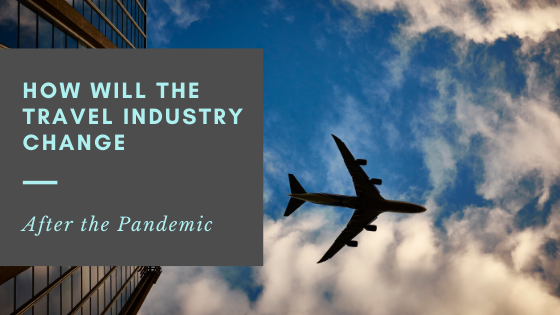The travel industry has bounced back from some pretty devastating crises before. According to the World Travel and Tourism Council (WTTC), since 2001, the travel industry has bounced back quicker from several crises than it has ever done in the past. Still, the entire world has never seen a crisis like the COVID-19 pandemic on such a global scale before, so this is unchartered territory for the travel and tourism industry, which was the first to feel the devastating effects this pandemic can have on business.
This has not stopped travel experts from making some basic predictions and assumptions of what travel will probably look like after COVID-19, however. Many experts believe that the industry’s ability to eventually rise above the crisis will hold as it did in the past because people have not changed their desire to get up and go, either for business or pleasure.
However, experts also admit that some criteria must be met to get people traveling again once flights and countries open up their borders again. Lower travel prices and safer travel protocols are two of the main ones.
There are sure to be a lot of changes in how people travel as well as how the travel industry answers the call of the ‘new normal’ when it comes to traveling, and the following changes are likely to happen as soon as the pandemic is over.
Cleanliness
After the pandemic, travel will be all about maintaining a clean environment more than ever before. New disinfection and sanitation policies will be made for hotels, airplanes, cruises, lodgings, accommodations, and transport. This will most likely entail proof that the place where tourists and travelers are staying and the vehicles they are traveling in have been disinfected according to national and international guidelines.
Airlines and hotels, in particular, are already coming up with new sanitation guidelines which include more frequent cleanings, hospital-grade sanitizing procedures, limited personal services, constant cleaning of community-touch areas, and increasing the supply of disinfectants and sanitizers for passengers and guests.
Cheaper Hotels
Since March 31st of this year, hotel rates have seen a massive decline in bookings and price which is likely to continue until the end of May. It is expected that hotel rates from March to May will decline by 30% since occupancy will decline by 20-40% during that same period.
This steep discount is likely to continue well after the pandemic starts leveling off given the fact that hotel rates remained low a long time after past crises, like the 911 attacks and the credit crisis and recession of 2007-2009.
These low hotel rates are not expected to put the hotel industry in serious long-term jeopardy. Even if ownership of name-brand hotels changes during the crisis and its aftermath, hotels will eventually come back to normal prices and profitability.
Lower Airfares
There is no doubt that there are going to be severe global economic repercussions equated to the COVID-19 virus. The UN expects the global economy to shrink one percent this year (2020) due to the corona pandemic. In short, countries will be making less money, so their people will be making less money. This is exactly why it makes little sense for airlines to increase their fare prices to try and make up for what they lost, especially when they want people to start flying again as soon as they are allowed to.
Airlines across the globe will most likely slash their prices drastically as well as sell fewer seats to entice passengers to start flying as before. The lower prices won’t scare off those who are already suffering the economic setback due to COVID-19, and the emptier airplane will give passengers a sense of safety as they can maintain social distance during their flight.
As it stands right now, travel experts believe business people will comprise the majority of airline travelers first, followed by domestic, and then international leisure travelers.
Hotel Rooms Over Rentals
If it is going to take some time for hotels to return to their former glory, it will take even longer for vacation rentals to do the same. The fact is that hotel chains will be in a better position to regulate and maintain safety and cleanliness standards than Airbnb rentals will.
Guests are going to feel safer knowing that their hotel room has been cleaned and sanitized according to standardized guidelines. The pandemic will still be fresh in travelers’ and tourists’ minds and therefore the better communicator is going to get their business.
Since hotel chains will have more of an advertising budget than vacation rental owners, they will be able to market their cleaning and safety measures to the masses and therefore gain more market share than their alternative lodging competitors. More market share means more bookings and quicker recovery time.
Fewer Airline Fees and More Flexible Bookings
Along with lower fares and emptier seats, airlines will probably reduce or eliminate cancellation and change fees, as well as offer more flexible options for bookings and re-bookings for some time until the world gets acquainted with airline travel and new safety guidelines and rules.
The more flexible, less stringent nature of their approach will be spurred on by their desire to get things back on track and people flying as regularly as before. If all goes well, they will more than likely reinstate their former fees and become more stringent with their re-bookings sometime by the middle of next year (2021).
Conclusion
Travel and tourism industries have indeed taken a hit due to the current pandemic. However, they have both already begun to adjust and start implementing safety standards that meet international and national safety guidelines along with planning to lower travel and lodging rates to encourage business once again. If there is an industry that can bounce back quickly from the current pandemic, it is travel and tourism. They have done it many times in the past and are in a great position to do it again.

